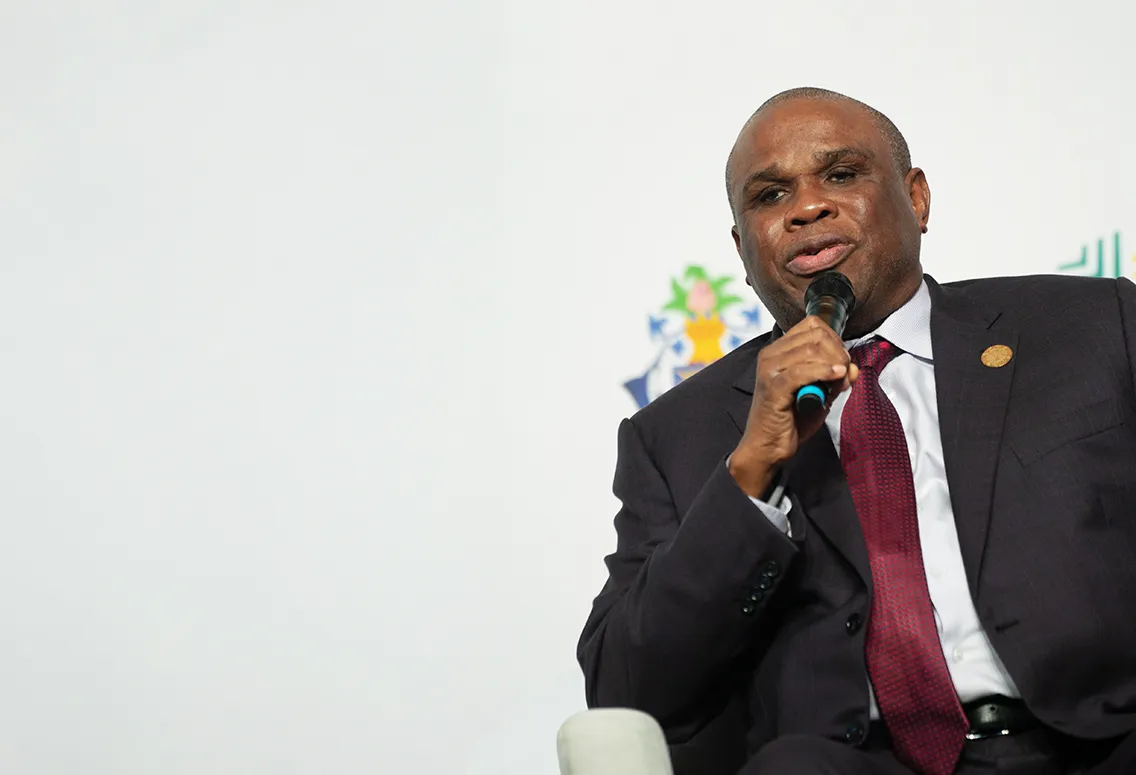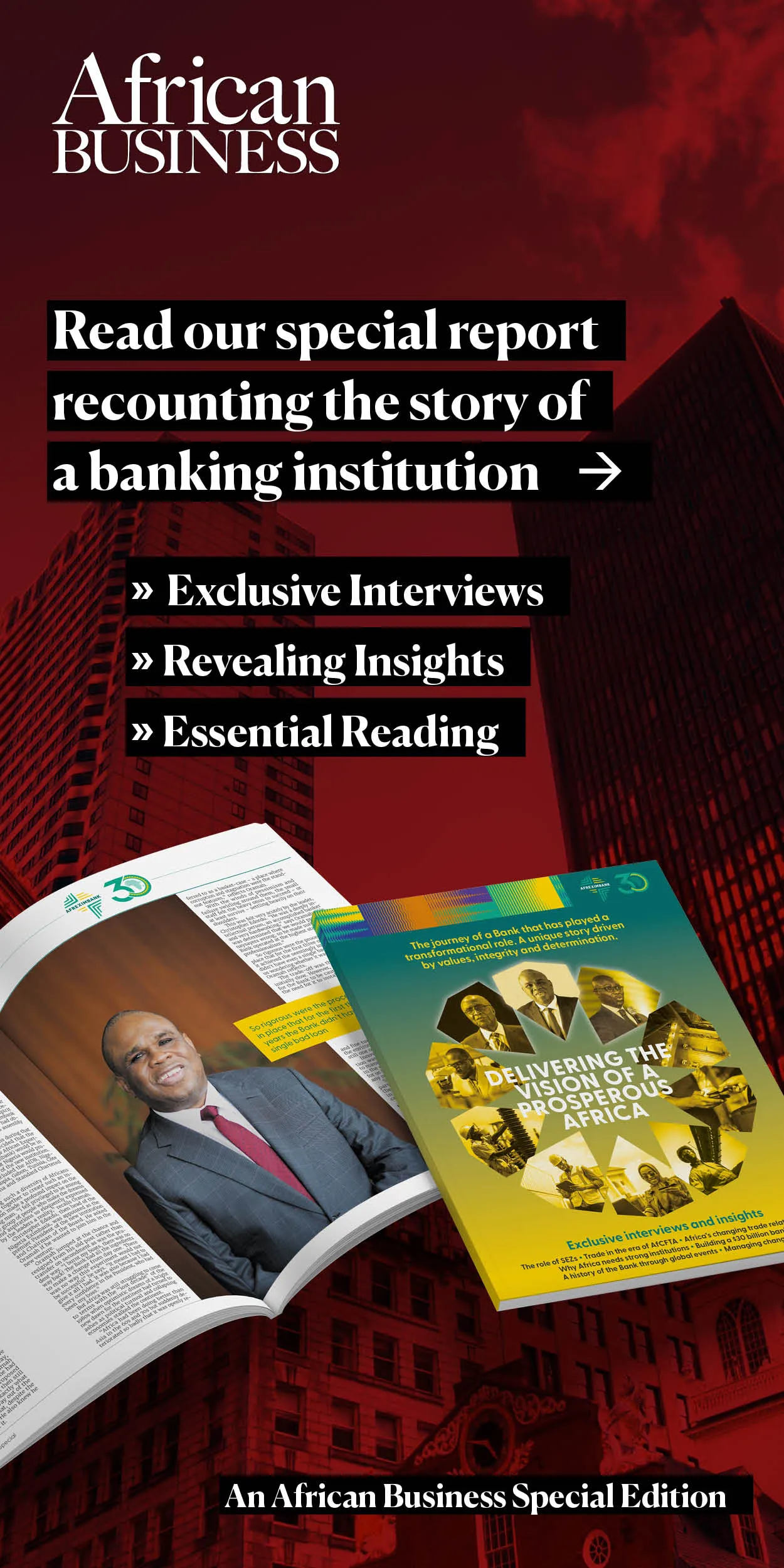This article was produced with the support of Afreximbank
The African Export-Import Bank (Afreximbank), first established in 1993 as a trade facilitation institution for African countries, has been expanding its mandate over the years and is now an integral part of the continent’s development agenda, working closely with the African Union (AU), other Africa-focussed development finance institutions and the private sector to stimulate growth across several sectors of the continental economy. With a balance sheet in excess of $36bn, having grown fourfold in less than 10 years, the bank has built the capacity to match its intentions, resulting in its growing impact and influence in the region.
In line with its original mandate, the bank has been one of the key drivers of the African Continental Free Trade Area (AfCFTA), the initiative to create a single, borderless market across the continent’s 54 countries. According to projections by the World Bank, the AfCFTA has the potential to lift 50 million people out of poverty, boost overall incomes by 8%, expand intra-African exports by as much as 109% and enhance international exports by 32% by 2035.
Afreximbank has launched several initiatives to support the AfCFTA.
In 2023 the bank deployed 189 financial investments across the continent, totalling $18.1bn. These investments facilitated an increase of approximately $8.9bn in intra-African trade, accounting for 4.7% of total intra-African trade and supported $1.9bn in Africa’s total manufactured exports, representing 1.5% of the continent’s manufactured exports. This financial support also contributed to the creation of an additional 145,129 direct jobs across various sectors in Africa.
Afreximbank has been actively involved in funding projects that drive industrialisation and infrastructure development. In 2024, the bank’s development impact investment arm, the Fund for Export Development in Africa, made a strategic investment of $300m in ARISE Integrated Industrial Platforms. This investment is part of a $443m capital raise, with an additional $143m contributed by the Africa Finance Corporation. The funding aims to develop industrial ecosystems that enhance value addition and export-oriented industrialisation across Africa. “We believe that we need to create the supply chains that will make Africa the next manufacturing hub,” Professor Benedict Okey Oramah, president and chairman of the bank’s board of governors told CNN in an interview.
The bank’s support for industrialisation and increased intra-African trade derives from its mission to boost self-sufficiency on the continent, especially under its current leadership. Oramah argues that locally producing the $50bn of light manufactures that Africa imports annually would reduce external deficits, create millions of jobs and a dynamic circular economy. It is also the reason that the bank is backing the joint effort by Zambia and the Democratic Republic of Congo to produce battery precursors for electric vehicles, instead of exporting the critical minerals from the two countries to other parts of the world. The idea is to give not just Zambia and the DRC, but the continent, a larger stake in a market that is expected to hit $620bn by 2030 and $63 trillion by 2050.
The bank has also made some interventions in social infrastructure, such as its partnership with King’s College Hospital, London, to establish the African Medical Centre of Excellence in Abuja, Nigeria. This quaternary-level, multi-specialty medical institution is designed to address the continent’s critical need for advanced healthcare infrastructure, making high-quality healthcare services available to both low- and high-income patient groups across Africa.
Oramah has said that the facility is a response to a dire need on the continent: it “was born out of the urgent need to address the inadequacies in healthcare facilities, particularly in dealing with non-communicable diseases…
“With only 48% of Africa’s population having access to essential healthcare services, the situation demanded immediate attention,” he said at a health forum organised under the auspices of the hospital in Abuja in February.
Perhaps the bank’s most significant interventions have come in moments of crisis, especially in the last decade. In response to the commodity crisis of 2015–2016, Afreximbank introduced the Countercyclical Trade Liquidity Facility (COTRALF), an emergency intervention product. Through this initiative, the bank disbursed approximately $10bn to African central and commercial banks, helping beneficiary countries manage and adapt to the commodity price shocks in an orderly manner.
During the pandemic, Afreximbank was instrumental in the procurement of vaccines for African nations, working closely with the African Union’s Africa Vaccine Acquisition Task Team.
The bank provided a $2bn financing framework to enable African countries to purchase vaccines, allowing the continent to secure approximately 400 million doses of the Johnson & Johnson vaccine for distribution in Africa and the Caribbean.
The bank also launched the $8bn Pandemic Trade Impact Mitigation Facility to assist African economies in managing the financial shocks caused by the Covid-19 pandemic. The facility helped stabilise economies, maintain essential imports, and support the private sector, enabling the continuity of critical sectors and staving off the potential collapse of some African economies.
Again, when the war in Ukraine exacerbated food insecurity in Africa by disrupting grain supplies from two of the continent’s major trading partners Afreximbank launched the Ukraine Crisis Adjustment Trade Financing Ukraine Crisis Adjustment Trade Financing Programme for Africa in response. The $4bn facility was designed to provide financing to African countries for the procurement of grain, fertiliser, and other essential commodities that had become scarce due to the crisis. The initiative allowed African countries to maintain critical supply chains, averting a deeper food security crisis.
The bank has been able to make these and other interventions due to the phenomenal growth in its own capacity. According to its results for the third quarter of 2024 it remains in a solid financial position. Net interest income for the nine months grew by 22% year-on-year to reach $1.3bn, compared to $1bn in the same period in 2023. Interest income increased by 25% to $2.2bn, driven by higher interest earnings and effective cost management.
The Group’s total on-balance-sheet assets and contingent liabilities closed at $36.3bn, a marginal decline from $37.3bn at the end of 2023. Shareholders’ funds increased by 7.96% to $6.6 billion, driven by retained profits and fresh equity contributions.
The bank’s continued strength is fuelling its growing ambitions, such as a push to reach and coordinate the capacities of Africans in the diaspora. As part of this reach for “Global Africa,” the bank recently opened the Afreximbank Africa Diaspora Center in collaboration with the Africa Center in New York. In the same vein, it has opened an office in Bridgetown, Barbados to serve member states of the Caribbean Community, 12 of which have joined the bank and will have access to a $1.5bn fund that the bank has made available to its new Caribbean members.
Oramah believes that the bank’s foray into what the AU has described as “the sixth region” brings both economic and non-economic potential benefits. “I have always felt that when we trade with each other on the African continent, and with our brothers and sisters in the Caribbean, we are doing much more than business.
“We are, in fact, re-establishing our knowledge of each other and renewing bonds of history and solidarity which have been frayed by centuries of displacement, alienation and colonisation,” he remarked at the bank’s 2024 annual general meetings, which were held, significantly, in Nassau, Bahamas.

 Sign in with Google
Sign in with Google 
